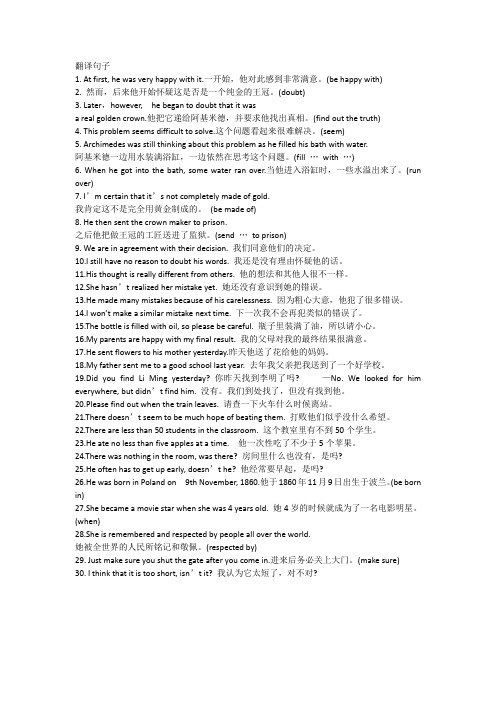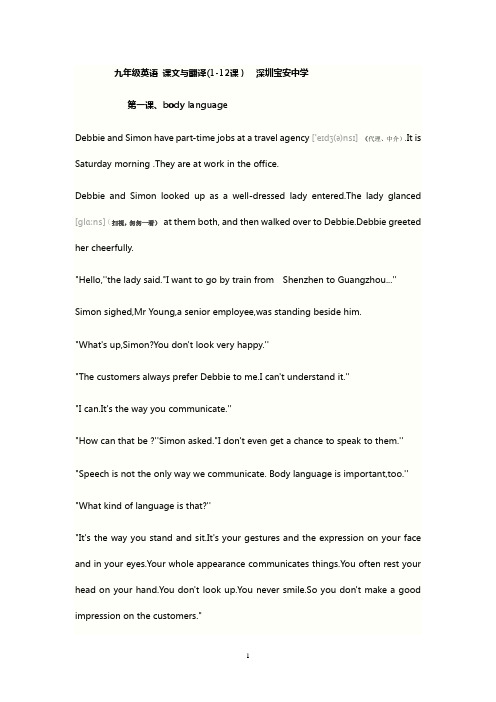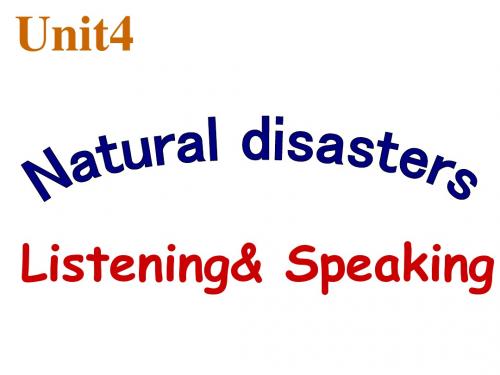深圳牛津版九年级下课文带翻译
牛津深圳版九年级下册中英翻译资料

翻译句子1. At first, he was very happy with it.一开始,他对此感到非常满意。
(be happy with)2. 然而,后来他开始怀疑这是否是一个纯金的王冠。
(doubt)3. Later,however, he began to doubt that it wasa real golden crown.他把它递给阿基米德,并要求他找出真相。
(find out the truth)4. This problem seems difficult to solve.这个问题看起来很难解决。
(seem)5. Archimedes was still thinking about this problem as he filled his bath with water.阿基米德一边用水装满浴缸,一边依然在思考这个问题。
(fill …with …)6. When he got into the bath, some water ran over.当他进入浴缸时,一些水溢出来了。
(run over)7. I’m certain that it’s not completely made of gold.我肯定这不是完全用黄金制成的。
(be made of)8. He then sent the crown maker to prison.之后他把做王冠的工匠送进了监狱。
(send …to prison)9. We are in agreement with their decision. 我们同意他们的决定。
10.I still have no reason to doubt his words. 我还是没有理由怀疑他的话。
11.His thought is really different from others. 他的想法和其他人很不一样。
12.She hasn’t realized her mistake yet. 她还没有意识到她的错误。
深圳牛津版最新九年级(下)-课文-(带翻译)

深圳牛津版最新九年级(下)-课文-(带翻译)初三(下)课文(翻译)1—3Unit 1 课文(翻译)Great explorations[eksplə'reɪʃ(ə)n]探索郑和下西洋The voyages ['vɒɪɪdʒ] 航行of Zheng He郑和是中国著名的探险家。
1405,他发起了中国七大航海史上的第一次。
这比哥伦布第一次航行发现美洲新大陆早了近一个世纪。
他的旅行是如此重要,人们至今仍然研究。
Zheng He was a famous Chinese explorer. In 1404, he set off出发from China on the first of seven great voyages ['vɒɪɪdʒ] 航行. This was nearly['nɪəlɪ]差不多a century ['sentʃʊrɪ]世纪before Christopher['krɪstəfə(r)] Columbus[kə'lʌmbəs] first set sail启航on his journey['dʒɜːnɪ]旅途of discovery[dɪ'skʌv(ə)rɪ]发现to America. His travels were so important that they are still studied today.郑和1371 出生于云南,后来成为明朝永乐皇帝可信任的官员。
皇帝下令郑造访并探索中国以外的土地,他的任务是发展关系,建立与国外贸易通道。
Zheng He was born in Yunnan in 1371. He rose to 升迁;上升到become a trusted受信任的official [ə'fɪʃ(ə)l]官员of the Yongle Emperor['emp(ə)rə]皇帝of the Ming Dynasty['daɪnəsti]朝代. The emperor ordered Zheng He to visit and explore[ɪk'splɔː;ek-]探索the lands outside China. His task[tɑːsk]任务was to develop relations[dɪ'veləp]发展关系and set up建立trade[treɪd]贸易routes[ruːt]路线;航线with foreign countries.在短短几年内,他建造船舶组成了一支庞大的舰队,是当时世界上最大的。
2024年牛津深圳版英语初中全册课文翻译句子

初中英语课文句子翻译目录七上U1~U2 (3)七上U3~U4 (4)七上U5~U6 (5)七上U7~U8 (6)七下U1~U2 (7)七下U3~U4 (8)七下U5~U6 (9)七下U7~U8 (10)八上U1~U2 (11)八上U3~U4 (12)八上U5~U6 (13)八上U7~U8 (14)八下U1~U2 (15)八下U3~U4 (16)八下U5~U6 (17)八下U7~U8 (18)九上U1~U2 (19)九上U3~U4 (20)九上U5~U6 (21)九上U7~U8 (22)九下U1~U2 (23)九下U3~U4 (24)九下U5~U6 (25)1.我的梦想是成为一名工程师。
(dream)2.我擅长游泳和打篮球。
(be good at)3.我愿意与来自世界各地的年轻人交朋友。
(would like to;make friends with)4.我和家人住在山下的房子里。
(live with...;close to...)5.我喜欢在空闲时间放风筝。
(in my free time)6.我是一名初中生。
我喜欢上学。
(junior high school;love)7.我家离我的学校很近,所以我经常走路上学。
(close to; on foot)8.我喜欢了解世界的不同地方。
(enjoy;learn about)9.我经常在学校过得很开心。
(have a good time)10.他们把日记看作朋友。
(think of...as...)11.我昨天收到了来自德国朋友的来信。
(hear from)12.我会尽我所能站在她身边。
(close to)13.我的梦想是环游世界。
(dream)14.他想要什么都擅长,但那是不可能的。
(be good at)15.如果我是老师,我会和学生们成为好朋友。
(make friends with)16.我想要走路去深圳湾公园。
(on foot)17.我享受学习中国历史和传统文化。
九年级英语 课文与翻译(1-12课) 深圳宝安中学

九年级英语课文与翻译(1-12课)深圳宝安中学第一课、body languageDebbie and Simon have part-time jobs at a travel agency['eɪdʒ(ə)nsɪ](代理、中介).It is Saturday morning .They are at work in the office.Debbie and Simon looked up as a well-dressed lady entered.The lady glanced [glɑːns](扫视,匆匆一看)at them both, and then walked over to Debbie.Debbie greeted her cheerfully."Hello,''the lady said."I want to go by train from Shenzhen to Guangzhou...'' Simon sighed,Mr Young,a senior employee,was standing beside him."What's up,Simon?You don't look very happy.''"The customers always prefer Debbie to me.I can't understand it.''"I can.It's the way you communicate.''"How can that be ?''Simon asked."I don't even get a chance to speak to them.'' "Speech is not the only way we communicate. Body language is important,too.'' "What kind of language is that?''"It's the way you stand and sit.It's your gestures and the expression on your face and in your eyes.Your whole appearance communicates things.You often rest your head on your hand.You don't look up.You never smile.So you don't make a good impression on the customers.""but look at Debbie.she’s holding her head up.She makes eye contact with the customers.She smiles.That's why the customers go to her and not to you."After that,Simon decided to improve his body language.He sat up and smiled at the customers .Minutes later,a beautiful girl entered.She looked at Debbie and then at Simon.Without hesitation,she went to Simon and gave him a big smile.A few momentslater,she left happily.Mr Young came over at once and said,"You made a good impression on her." "that was my sister,"Simon said."She came to remind me that tommorow is her birthday. and she wanted to have lunch with me "全文翻译:Debbie 和Simon在一家旅行公司做兼职,现在是周六早上,他们坐在办公室里。
牛津深圳版九年级下册英语课件:unit 4《natural disa

B2 Make a conversation about the emergency. The characters should express different feeling, e.g. bravery, fear and worry. Follow the example.
Judy: (very afraid and crying) Oh, no! What are we going to do? Peter: (brave) Let’s hid under our desks. John: (worried) It’s not a good idea to hide there. The desks aren’t strong enough.
earth.
Arthur Helen
Barrry Josep hቤተ መጻሕፍቲ ባይዱ
make a list of everything he/ she wants to do prepare a disaster survival kit phone his/her parents
Write down all the good things in life
B1 Work in groups of four. Decide on an emergency situation. Follow the example. Time: 2:30 p.m. Place: In the classroom
Characters: Four students-Judy, Amy, Peter and John Situation: The students are sitting in the classroom and suddenly they feel the building shake. They immediately know it is an earthquake.
【最新】牛津深圳版九年级英语下册U2P1 Reading精品课件.ppt

Culture is the language, customs and way of life of the people in a country. Match the pictures with the sentences. Write the correct letters in the blanks. (P 18)
manage v. 完成(困难的事);勉力完成
Words Review
idiom n. 习语;惯用语 everyday adj. 每天的;日常的 uniform n. 校服 whatever pron. 任何事物;一切事物
pink adj. 粉红色的 purple adj. 紫色的 anyway adv. 无论如何;反正 especially adv. 尤其;特别 baseball n. 棒球运动 education n. 有教益的经历
Objectives:
1. Read to learn Brad Li’s experience in the US.
2. To learn some differences between American and Chinese culture
3. To learn the new words and usef.
= rain very heavily
What does Lo think about when he hears what
Hi says? He thinks about many cats and dogs falling to the ground.
Guess what the following idioms mean.
牛津版九年级下册英语书电子版

My Summer VacationThis summer vacation, I went to the seaside with my family. We had a wonderful trip.The first day we arrived, our first destination was the beach. We were really excited to see the blue sea. While walking, we saw a lot of interesting things, such as shells and starfish. My little brother especially liked the starfish and wanted to pick them up. Fortunately, my father convinced him not to do that. After enjoying the scenery, we had lunch on the beach. The seafood was so delicious. And then, we went swimming. The water was not too cold, which made us all enjoy the swim.On the second day, we drove to a nearby fishing village. There was so much seafood sold in the village, and it was so fresh, that we were amazed. We also went to a mountain temple, where there were many Buddha statues. We took a lot of pictures and bought some souvenirs.On the third day, we climbed the nearby mountain. The view from the top was just amazing. We also did some camping, roasting marshmallows together. My little brother was so happy that he kept asking for more marshmallows.My family's summer vacation was truly memorable. We had a lot of fun and got to learn a lot about the local culture. I'm already looking forward to the next summer vacation.。
深圳牛津版最新九年级初三(下 课文 (带翻译

初三(下)课文(翻译)1—3Unit 1 课文(翻译)Great explorations[ekspl?'re??(?)n]探索郑和下西洋每次航次结束,郑和返回时都带回在中国从没见过的很多东西,譬如来自非洲的长颈鹿。
除了发展贸易,航行也带动了文化和技术的交流,帮助了这些国家和地区的发展。
At the end of each voyage, Zheng He returned with many things that were seen in China for the first time, such as a giraffe[d??'rɑ:f]长颈鹿 from Africa['?fr?k?]非洲. Besides[b?'sa?dz]除了 developing trade发展贸易, the voyages also encouraged[?n'k?r?d?; en-]鼓励 the exchange[?ks't?end?]交换 of cultures['k?lt??]文化 and technologies[tek'n?l?d??]技术. They helped the development[d?'vel?pm(?)nt]发展 of thosecountries and regions['ri?d?(?)n]地区.1433 年,郑和在他最后一次航行中去世了。
然而,他的航行成就是如此巨大,人们仍然铭记他,视他为开拓世界各地不同民族之间文化交流的先驱。
Zheng He died in 1433 during his last voyage['v???d?]航行. However, his voyages were such a huge achievement [?'t?i?vm(?)nt]成就that people still remember him as a pioneer[pa??'n??]先锋 in opening up开创cultural ['k?lt?(?)r(?)l] 文化的contacts['k?nt?kt]接触;联系 between different peoples around练习 it in错过the History lesson today. Can you tell me what you learnt, please?当然可以,我们学了郑和他的航行。
- 1、下载文档前请自行甄别文档内容的完整性,平台不提供额外的编辑、内容补充、找答案等附加服务。
- 2、"仅部分预览"的文档,不可在线预览部分如存在完整性等问题,可反馈申请退款(可完整预览的文档不适用该条件!)。
- 3、如文档侵犯您的权益,请联系客服反馈,我们会尽快为您处理(人工客服工作时间:9:00-18:30)。
初三(下)课文(翻译)1—3Unit 1 课文(翻译)Great explorations[eksplə'reɪʃ(ə)n]探索郑和下西洋The voyages ['vɒɪɪdʒ] 航行of Zheng He郑和是中国著名的探险家。
1405,他发起了中国七大航海史上的第一次。
这比哥伦布第一次航行发现美洲新大陆早了近一个世纪。
他的旅行是如此重要,人们至今仍然研究。
Zheng He was a famous Chinese explorer. In 1404, he set off 出发from China on the first of seven great voyages ['vɒɪɪdʒ] 航行. This was nearly['nɪəlɪ]差不多 a century ['sentʃʊrɪ] 世纪before Christopher['krɪstəfə(r)] Columbus[kə'lʌmbəs] first set sail启航 on his journey['dʒɜːnɪ]旅途 of discovery[dɪ'skʌv(ə)rɪ]发现to America. His travels were so important that they are still studied today.郑和 1371 出生于云南,后来成为明朝永乐皇帝可信任的官员。
皇帝下令郑造访并探索中国以外的土地,他的任务是发展关系,建立与国外贸易通道。
Zheng He was born in Yunnan in 1371. He rose to 升迁;上升到become a trusted受信任的official [ə'fɪʃ(ə)l]官员of the Yongle Emperor['emp(ə)rə]皇帝of the Ming Dynasty['daɪnəsti]朝代. The emperor ordered Zheng He to visit and explore[ɪk'splɔː; ek-]探索the lands outside China. His task[tɑːsk]任务was to develop relations[dɪ'veləp]发展关系and set up建立trade[treɪd]贸易routes[ruːt]路线;航线 with foreign countries.在短短几年内,他建造船舶组成了一支庞大的舰队,是当时世界上最大的。
这些船被称为宝船,它们大到足以承载25,000 人以及非常多的货物。
In a few years, he built a great fleet [fliːt] 舰队of ships, the biggest in the world at that time. The ships were known as 被称作treasure['treʒə]财宝ships. They were big enough to carry 25,000 people as well as 以及;还very large quantities of['kwɑntəti]大量的goods货物.从 1405 年至 1433 年,郑和前后共进行了七次远游,并参观了东南亚,中东,甚至非洲的东海岸。
看上去没有哪能远到他们去不了的地方。
这些航行使得中国通过贵重物品如黄金、白银和丝绸进行贸易。
From 1405 to 1433, Zheng He went on seven trips and visited South-East Asia[ˈeɪʒə]亚洲, the Middle East and even the east coast[kəʊst]海岸 of Africa. It seemed that nowhere was too far forhim to visit. These voyages['vɒɪɪdʒ]航行allowed China to trade[treɪd]交易valuable['væljʊb(ə)l]贵重的goods like gold, silver['sɪlvə]银 and silk[sɪlk]丝绸.每次航次结束,郑和返回时都带回在中国从没见过的很多东西,譬如来自非洲的长颈鹿。
除了发展贸易,航行也带动了文化和技术的交流,帮助了这些国家和地区的发展。
At the end of each voyage, Zheng He returned with many things that were seen in China for the first time, such as a giraffe[dʒə'rɑ:f]长颈鹿from Africa['æfrɪkə]非洲. Besides[bɪ'saɪdz]除了developing trade发展贸易, the voyages also encouraged[ɪn'kʌrɪdʒ; en-]鼓励 the exchange[ɪks'tʃendʒ]交换 of cultures['kʌltʃə]文化and technologies[tek'nɒlədʒɪ]技术. They helped the development[dɪ'veləpm(ə)nt]发展of those countries and regions['riːdʒ(ə)n]地区.1433 年,郑和在他最后一次航行中去世了。
然而,他的航行成就是如此巨大,人们仍然铭记他,视他为开拓世界各地不同民族之间文化交流的先驱。
Zheng He died in 1433 during his last voyage['vɒɪɪdʒ]航行. However, his voyages were such a huge achievement [ə'tʃiːvm(ə)nt] 成就that people still remember him as a pioneer[paɪə'nɪə]先锋 in opening up开创cultural ['kʌltʃ(ə)r(ə)l] 文化的contacts['kɒntækt]接触;联系 between different peoples around the world.阅读下面的对话和对练吧。
注意蓝色的字词。
Read the conversation[kɒnvə'seɪʃ(ə)n]交谈;会话 below[bɪ'ləʊ]在下面and practice['præktɪs]练习it in pairs两个两个地. Pay attention to 注意the words in blue.嗨,Tony,我今天错过了历史课,你能告诉我学了什么吗Doris: Hi, Tony. I missed错过 the History lesson today. Can you tell me what you learnt, please当然可以,我们学了郑和他的航行。
Tony: Of course. We learnt about Zheng He and his voyages.对不起,请再说一遍。
Doris: Sorry, could you repeat[rɪ'piːt]重复 that, please好的,我们学了郑和他的航行,他用贵重商品,如黄金、白银和丝绸做贸易。
Tony: Sure. We learnt about Zheng He and his voyages. He traded[treɪd] 交易valuable['væljʊb(ə)l]贵重的goods货物like gold, silver['sɪlvə]银 and silk[sɪlk]丝绸.对不起,我没听清,你说他买卖黄金、白银和……Doris: Sorry, I didn’t quite catch明白you. You said he traded gold, silver and…丝绸,有一次,他甚至带回来一只长颈鹿!Tony: Silk. Once[wʌns]一次;曾经;一旦 he even brought back带回 a giraffe[dʒə'rɑ:f]长颈鹿!马可·波罗Marco Polo在杭州西湖,有一个旅行者的小雕像,他的名字叫马可·波罗。
By West Lake[leɪk]湖, in the city of Hangzhou, there is a small statue['stætʃu]雕像 of a traveler. His name was Marco Polo.马可·波罗在威尼斯城长大,在现今的意大利。
1271 年,当他 17 岁的时候,他跟随他的父亲和叔叔开始了他的亚洲旅程,并且在长达 24 年中一直没有回家。
他的旅程横穿亚洲,沿着丝绸之路,游遍整个中国。
他很喜欢杭州,以至于他将其形容为“世界上最好的城市”。
Marco Polo grew up长大in the city of Venice['venis]威尼斯, in present-day['prezənt'dei] 当今的Italy. In 1271, when he was 17 years old, he set off出发 on a journey to Asia [ˈeɪʒə] 亚洲with his father and uncle, and did not return home until 24 years later. His travels took him across[ə'krɒs]横穿 Asia, along the Silk Road and throughout[θruː'aʊt]贯穿 China. He loved Hangzhou so much that he described [dɪ'skraɪb] 描述it as “the finest city in the world”.当马可·波罗最终回到威尼斯时,当时有一场战争,他被抓获了。
他在监狱里时,他把他的旅行故事告诉了另一个人。
